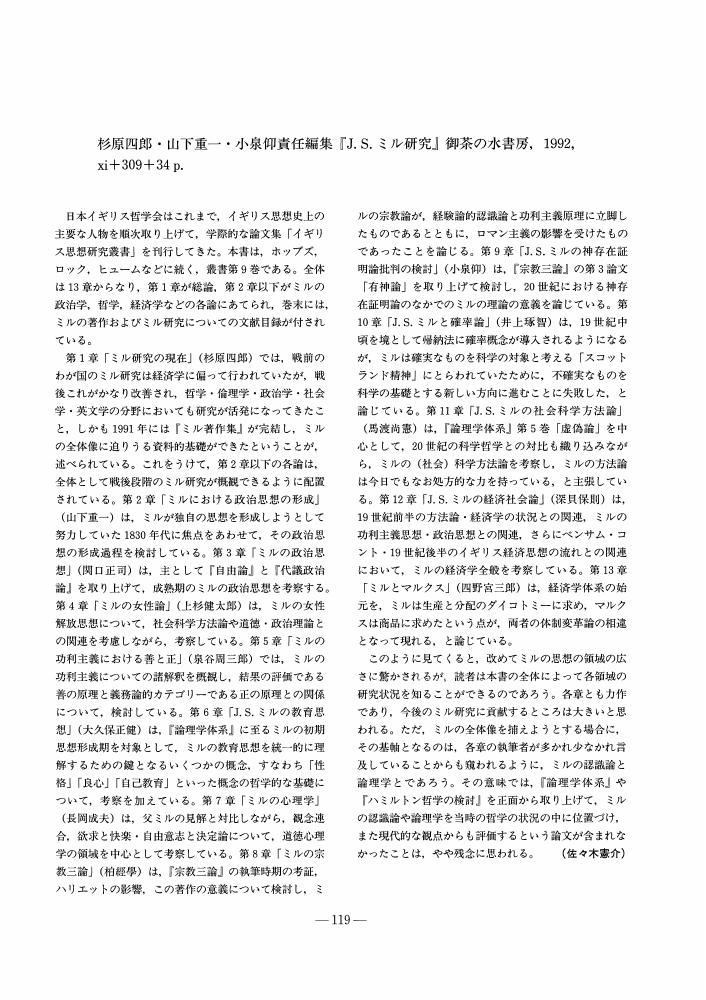5 0 0 0 OA J.S.ミルと歴史学派
- 著者
- 佐々木 憲介
- 出版者
- 北海道大学大学院経済学研究科
- 雑誌
- 經濟學研究 (ISSN:04516265)
- 巻号頁・発行日
- vol.60, no.3, pp.15-27, 2010-12-09
1870年代から20世紀初頭にかけて, イギリスにおいても歴史学派と称される一群の経済学者が現われ経済学上の有力な潮流となった。歴史学派は古典派の理論的・演繹的方法に対して歴史的方法を対置し, 古典派の方法論をさまざまな角度から批判した。しかし, 古典派を代表する経済学者の一人であったJ.S.ミルは, その『論理学体系』においてすでに歴史的方法について語っており, それ以外にも歴史学派のものとされる主張を展開していた。はたして, ミルの経済学方法論はイギリス歴史学派とどのような関係にあったのか。クリフ・レズリーは, ミルとリカードウとの違いを強調したが, 歴史学派の多くはむしろ両者の共通性に注目した。ミルは, 経済学の原理に関してはリカードウ派の立場を堅持しており, 新しく示された観点は観点の提示に留まっていて歴史研究の先駆的な業績があったわけではなかった。そのような意味で, 歴史学派にとってのミルは旧学派の一員であった。しかし, 実践的な意味では, ミルの学説は社会改良主義への突破口の一つになった。何人かの歴史学派がミルを評価したのはむしろこの点であった。
2 0 0 0 OA A.トインビーの歴史的方法と社会改良主義
- 著者
- 佐々木 憲介
- 出版者
- 北海道大学大学院経済学研究科
- 雑誌
- 經濟學研究 (ISSN:04516265)
- 巻号頁・発行日
- vol.52, no.4, pp.21-39, 2003-03-11
2 0 0 0 IR J.K.イングラムと歴史学派運動
- 著者
- 佐々木 憲介
- 出版者
- 北海道大学
- 雑誌
- 經濟學研究 (ISSN:04516265)
- 巻号頁・発行日
- vol.51, no.3, pp.105-125, 2001-12-11
経済学における理論派と歴史派との論争といえば、オーストリア学派の創始者C.メンガーとドイツ歴史学派の総帥G.シュモラーとの間に起こった「方法論争」が有名であるが、実は類似の性格をもった論争が、攻守所を変えて、イギリスでも行われていた。ジョン・ケルズ・イングラム(John Kells Ingram, 1823-1907)は、イギリスにおける方法論争の重要な一翼を担った人物であり、オーギュスト・コントの観点から古典派経済学を批判した人物であった。イングラムは、歴史的方法が理論的方法に取って代わらなければならないと主張し、その歴史的方法によって、歴史の一般的法則を探究しようとした。イングラムはまた、経済学史に関する該博な知識に基づいて、歴史学派運動の経済学史上の意義を明らかにしようとした。つまり、もともと統一されていた社会諸科学の研究から、経済学がいったん部分学として分化し、それが再び統合されるべき時期にきていること、政治的束縛から産業活動を解放した経済的自由主義が、自由な活動ゆえの弊害を生み出し、それを解決するための社会改良が必要な時期にきていること、これらの事情を背景として歴史学派が成長してきたというのである。さらに、歴史学派運動の現在の中心地はドイツであるが、ドイツ歴史学派に先立ってコントとリチャード・ジョーンズとが歴史学派の観点を提示していたとし、イギリス歴史学派の運動もドイツの亜流ではないということを強調した。
1 0 0 0 OA J.S.ミルにおける生産の法則
- 著者
- 佐々木 憲介
- 出版者
- 北海道大学經濟學部
- 雑誌
- 經濟學研究 (ISSN:04516265)
- 巻号頁・発行日
- vol.44, no.4, pp.82-98, 1995-03
- 著者
- 佐々木 憲介
- 出版者
- 経済学史学会
- 雑誌
- 経済学史研究 (ISSN:18803164)
- 巻号頁・発行日
- vol.62, no.2, pp.100-101, 2020 (Released:2021-12-19)
1 0 0 0 OA 書評
1 0 0 0 IR J.S.ミルと歴史学派
- 著者
- 佐々木 憲介
- 出版者
- 北海道大学大学院経済学研究科
- 雑誌
- 經濟學研究 (ISSN:04516265)
- 巻号頁・発行日
- vol.60, no.3, pp.241-253, 2010-12
1870年代から20世紀初頭にかけて, イギリスにおいても歴史学派と称される一群の経済学者が現われ経済学上の有力な潮流となった。歴史学派は古典派の理論的・演繹的方法に対して歴史的方法を対置し, 古典派の方法論をさまざまな角度から批判した。しかし, 古典派を代表する経済学者の一人であったJ.S.ミルは, その『論理学体系』においてすでに歴史的方法について語っており, それ以外にも歴史学派のものとされる主張を展開していた。はたして, ミルの経済学方法論はイギリス歴史学派とどのような関係にあったのか。クリフ・レズリーは, ミルとリカードウとの違いを強調したが, 歴史学派の多くはむしろ両者の共通性に注目した。ミルは, 経済学の原理に関してはリカードウ派の立場を堅持しており, 新しく示された観点は観点の提示に留まっていて歴史研究の先駆的な業績があったわけではなかった。そのような意味で, 歴史学派にとってのミルは旧学派の一員であった。しかし, 実践的な意味では, ミルの学説は社会改良主義への突破口の一つになった。何人かの歴史学派がミルを評価したのはむしろこの点であった。
1 0 0 0 OA 長尾伸一『複数世界の思想史』名古屋大学出版会,2015 年,iv+315 頁+46 頁
- 著者
- 佐々木 憲介
- 出版者
- 経済学史学会
- 雑誌
- 経済学史研究 (ISSN:18803164)
- 巻号頁・発行日
- vol.59, no.2, pp.197-198, 2018 (Released:2019-10-12)
- 著者
- 佐々木 憲介
- 出版者
- 経済学史学会
- 雑誌
- 経済学史研究 (ISSN:18803164)
- 巻号頁・発行日
- vol.58, no.2, pp.95-97, 2017 (Released:2019-11-30)
1 0 0 0 OA 西沢保『マーシャルと歴史学派の経済思想』岩波書店, 2007, xvi+646頁
- 著者
- 佐々木 憲介
- 出版者
- 経済学史学会
- 雑誌
- 経済学史研究 (ISSN:18803164)
- 巻号頁・発行日
- vol.50, no.2, pp.105-106, 2009-02-05 (Released:2010-08-05)
- 著者
- 佐々木 憲介
- 出版者
- The Japanease Society for the History of Economic Thought
- 雑誌
- 経済学史研究 (ISSN:18803164)
- 巻号頁・発行日
- vol.49, no.1, pp.188-189, 2007-06-30 (Released:2010-08-05)
1 0 0 0 OA 古典派の経済人概念
- 著者
- 佐々木 憲介
- 出版者
- The Japanese Society for the History of Economic Thought
- 雑誌
- 経済学史学会年報 (ISSN:04534786)
- 巻号頁・発行日
- vol.41, no.41, pp.71-79, 2002 (Released:2010-08-05)
- 参考文献数
- 49
It is probably W. Bagehot who coined the term ‘economic man’. As is commonly acknowledged, however, ‘economic man’ played a substantial role in classical political economy long before the term was coined. This survey examines the literature treating the classical economic man from three aspects: motives and rationality, historical characteristics, and epistemological foundations. (1) The classical economic man was characterized by several motives and rationality. The motives included self-interest and the desire for wealth. Rationality indicated that economic man attempted to obtain additional wealth with as little sacrifice as possible. The motives, however, were deleted from the concept of neo-classical economic man set out in the 1930s, and rationality came to be considered as the essence of the notion. (2) Interpretations on the historical characteristics of economic man differ. Some regard the classical economic man as a real agent who appeared in a particular area and period. Others insist that the economic man is an abstract or hypothetical man, the features of which indicates a universal tendency applicable to all economic situations, although the realization of tendency is more or less interfered with by disturbing forces. The relations between society and the individual are another issue. The economic man is said to be based on methodological individualism, but the classical concept does not ignore the influence of society upon individual. (3) Classical methodologists such as N. W. Senior, J. S. Mill, and J. E. Cairns thought that the motives and rationality of economic man could be clarified through the processes of reflection and analogy. Senior, however, realized a defect in this method. Adam Smith suggested an interesting method by which to test the results of reflection and analogy. If the concept of economic man is accepted, it can be considered to stand as a true assumption of economic action.
- 著者
- 佐々木 憲介
- 出版者
- 経済学史学会
- 雑誌
- 経済学史学会年報 (ISSN:04534786)
- 巻号頁・発行日
- vol.30, no.30, pp.119, 1992 (Released:2010-08-05)
1 0 0 0 OA クリフ・レズリーの歴史的方法
- 著者
- 佐々木 憲介
- 出版者
- 北海道大学經濟學部 = HOKKAIDO UNIVERSITY SAPPORO,JAPAN
- 雑誌
- 經濟學研究 (ISSN:04516265)
- 巻号頁・発行日
- vol.50, no.3, pp.10-31, 2000-12
1 0 0 0 OA 平成22年度「経済思想」講義資料
- 著者
- 佐々木 憲介
- 巻号頁・発行日
- 2009






